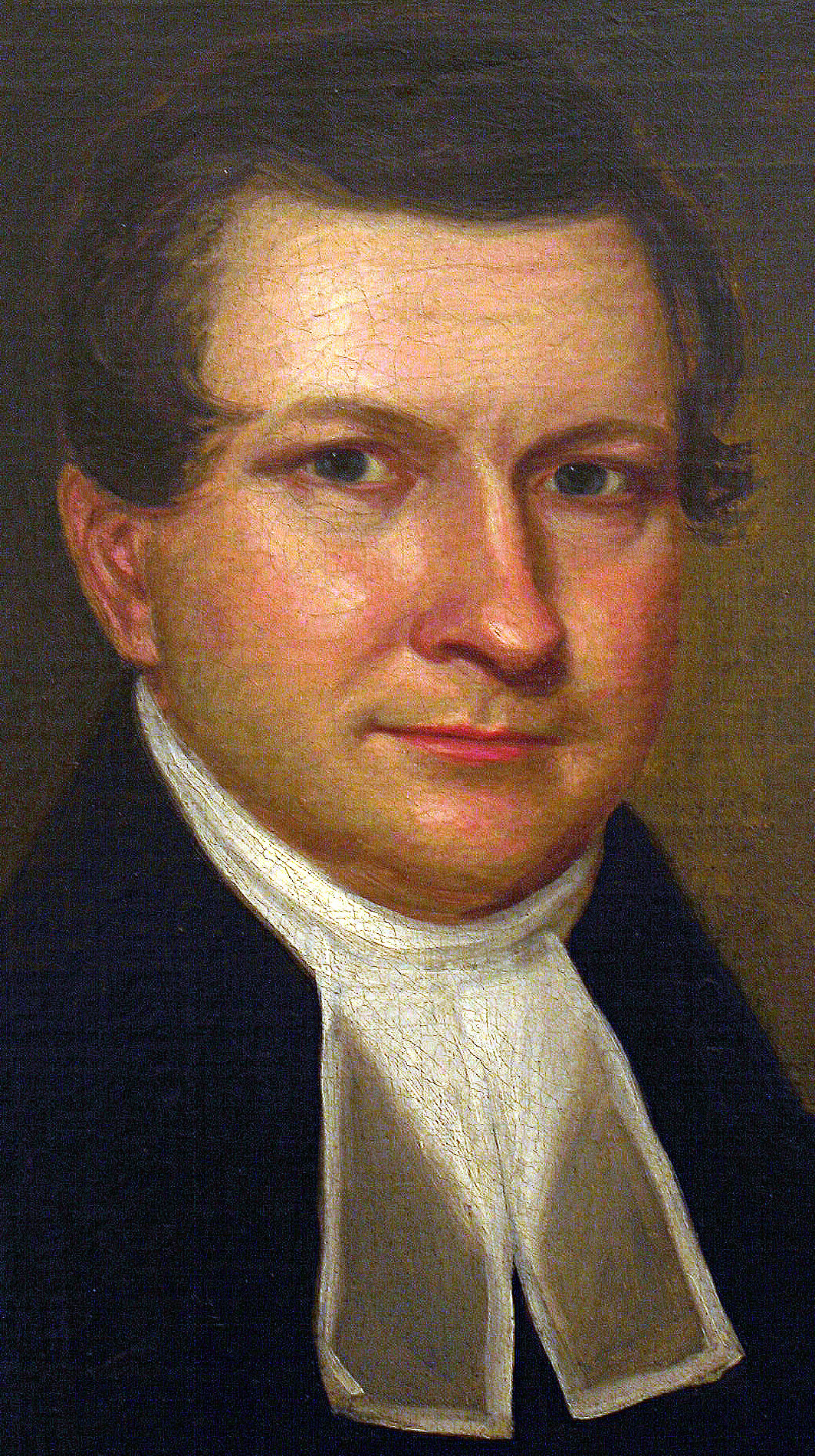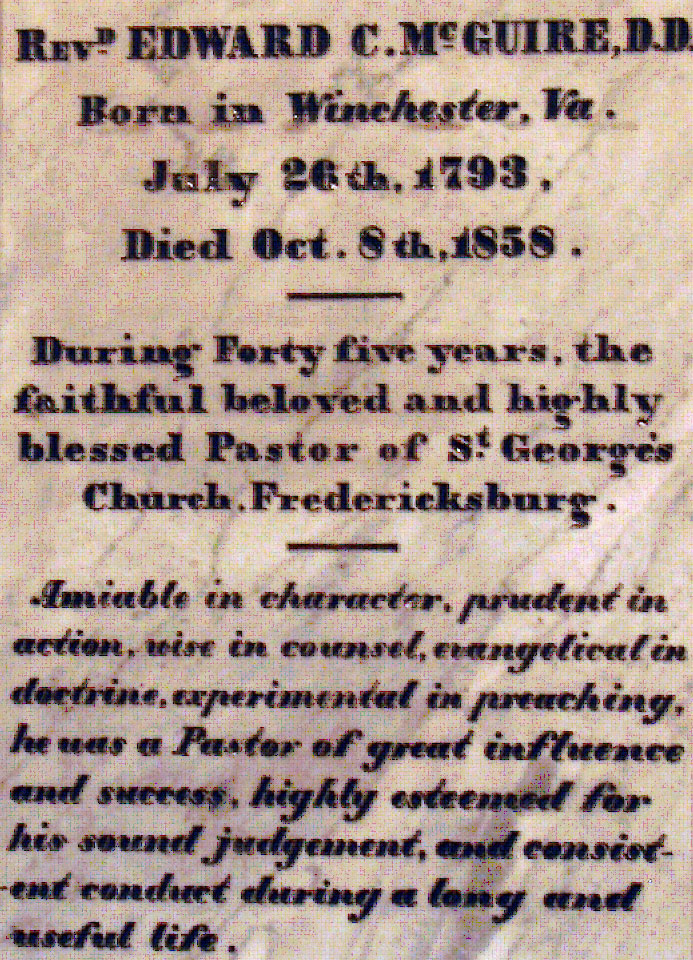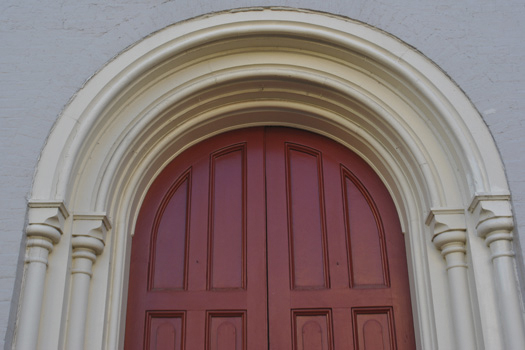

Part 1 – The Builder
Edward McGuire is arguably the most important figure in St. George’s almost 300 year history. He served as rector for 45 years, 1813-1858 the longest in our record and served in all three St. George’s Church buildings and helped to build two of them. That alone makes him a pivotal figure in this Church. But, his influence stretched beyond the confines of St. George’s
What accounts for his success ?
He was a builder first and foremost at St. George’s.
At his death, the newspapers wrote many accolades and focused on the numbers he brought to the Church. The Fredericksburg News wrote on October 12, 1858 wrote “Under his faithful culture his congregation has greatly multiplied in numbers and flourished in all of its highest spiritual interests” The Weekly Advertiser at the same time noted he had baptized a whole generation in his communion and increased the church from a mere handful to hundreds. From a small number when he arrived the Church had grown to 259 communicants a year after his death. Part 1 of McGuire looks at this legacy.
However, this glosses over his work in the community level in education and social causes and at the Diocese. Level. He was an evangelical, spreading the “good news” through action and participation. Part 2 examines this facet of McGuires career. The qualities noted in the plaque – amiable in character, prudent in action, a man with sound judgment and consistent conduct united both his work as a builder and evangelical .
McGuire came here as a lay reader since he was too young to be ordained in 1813. He was never trained in a seminary but read with three ministers, including two future leaders in the Church, Rev. Wiliam Meade, rector of Christ Church in Alexandria and then with Rev William Wilmer, rector of St. Paul’s in the same city.
He entered the church at a time of disarray. Carroll Quenzel in his history of St. George’s corroborates this point. When he came there were “less than a dozen” in the Church. He reports the congregation was in a “state of complete prostration” where those that remained were much “discouraged.” To make matters worse, McGuire felt the congregation had received him with “very little cordiality.” The Church building was “a dark and cheerless sanctuary.”
It was clearly McGuire had the courage to forge ahead to build the second church though it appears the Trustees were making most of the decisions with McGuire not in attendance with the Trustees until the beginning of 1816 after the second church was consecrated.
Quenzel praises his “zeal and energy” even with setbacks of detractors and health problems early in his ministry. (Based on both the challenges of the Church and the number of community activities, McGuire could have overexerted himself).
His early biographer John Johns, the fourth Bishop of Virginia, cites his “usefulness” in keeping religion at the forefront of his parishioners, “building up believers.” He held frequent services (6 or 7 times a week) and performed baptisms often after morning services as well as preaching in Falmouth in the afternoon. By the late 1840’s Philip Slaughter in his history reported he had baptized 807 persons, including 50 adults and married 524. Just before his death in 1858 he had presented 88 people to Bishop Meade for confirmation, certainly a high point in his ministry. Joseph Packard, a professor at Virginia Theological Seminary writes that “McGuire not only built up his own parish, but went through Spotsylvania, Stafford, Essex, Caroline, Culpeper and Organ counties preaching and visiting. “
McGuire was able to personalize religion based on his own religious struggle. In his early life he had periods of religion but as he said in his diary. “I blundered and fell often” He began the study of law but was visited by the Holy Spirit – “This last “visitation of the savior” was instantaneous and sudden as a flash of lightning from the clouds.” It was pure grace, unsought. Packard quotes McGuire application of grace and breaking religion down into basic struggle with worldly temptations and the role of grace. “A work of grace quickly commenced in the Church. Souls were converted by God and aided by their prayers, we began to life up our head and pursued our work with increased diligence.”
McGuire’s life was one of service and accessibility to his parishioners. Faulkner Hall erected in 1823 was constructed according to Johns so he could meet parishioners other than on Sunday and in small groups. Johns said that he excelled in pastoral visits and was current on the state of his parishioners. He not only visited his parishioners here but others in surrounding counties and organized other ministers to support other parishes in the region.
Johns finally cites McGuire’s personal religious habits and piety as part of his success. He noted his soul-searching in connection with daily meditations.
McGuire lived religion. He taught by example by his own conversion which occurred like a “flash of lightning” while studying law. He kept a “spiritual diary between 1819 -1831 that speaks of the challengers of realigion
McGuire wrote about “my great insufficiency for the work of the ministry.” This led to his constant emphasis on improvement and “a courageous spirit, neither deterred nor dismayed by difficulties.” “O That I may serve him in future better than I had ever yet done.”
He had health difficulties until the middle 1820’s , and wrote about a number of detractors but he moved on focusing on God’s strength and will. “My mind harassed by malignity of my enemies, endeavoring to disturb my peace and would ruin my fame.” Above all religion was a joyous experience for him but it still was a challenge. As he writes in his diary in March, 1819 “My soul engaged in shaking off prejudices, bigotry and endeavoring to promote harmony and unanimity among Christians” In other cases his “mind was dejected” by the “worldymindedness” of those around him. At times in his life he wrote and criticized plays, horseracing, gambling and the drink.
Early on his dedication shows resulted – by March 28,1819 as he writes a “very full Church – 4 or 500 people” and it wasn’t Easter. There were the beginning of revivals in the 1820. McGuire noted in 1823 there are “few instances in which a revival has been characterized by more genuine or decided cases of conversion.” However by 1826 while McGuire noted increases to the Annual Council and the service attendance though he regrets that “few out of so large a congregation have given themselves up to the Lord.” A major revival occurred in 1831 as a 2nd Great Awakening swept across America resulting in 85 new members and increased zeal. This time he note “a fresh impulse has been given to the activity of members” leading to “deeds of practical benevolence and christian charity.” He was not able to maintain the increases in future years though Church’s outreach was not diminished.
The increase of the Church size was one reason why the 2nd Church felt cramped and the push for a new church began as early as 1831. When it was completed he wrote proudly to the Annual Council in 1849 “The undertaking reported to the last Convention has issued in the completion of a new Church, large and commodious, gratifying the taste in its architectural beauty and promising much advantage to us in prosperity and growth.”
Beyond the work he did for the Church, his sterling character was appreciated. The Fredericksburg News wrote “In the lapse of 45 long years, he has kept himself from the slightest reproach.” The Weekly Advertiser said it simply – “A good man gone.” McGuire died having just preached his 45th anniversary sermon. The Advertiser describes his last sermon vividly with “feeble voice and utterance choked with emotion. He noted it would be the last time he partook of the Lord’s Supper on earth.”
Part 2 – The Evangelical
Edward McGuire’s success at St. George’s was his work in building St. George’s. This concluding segment moves McGuire into his significant work outside of St. George’s at the Diocesan level as well into his evangelism in Fredericksburg and beyond.
McGuire came of age when the Diocese of Virginia was in a pitiful shape. From 59 ministers with priests in 1799 there were only 19 in 1814. Virginia’s economy was in decline. In addition to the lack of financial support and a uniform means for educating those preparing for ordination, priests who had been driven out of the more closely governed dioceses of New England took Virginia parishes and contributed to the overall decline. Attendance at Conventions declined, and between 1799 and 1812, so that it was possible to muster a quorum only twice.
Bishop James Madison, the first Bishop in Virginia, had died in 1812 and the clergy elected 66 year old John Bracken as Bishop. A young group including future Bishop William Meade, Rev William Wilmer and layman Edward McGuire looked to block the clergy-led successor and wage a religious coup to elect younger leadership, pressuring Bracken to resign in 1813. McGuire thus had a prominent role from the beginning on the Diocesan level even as he assumed the rector position of St. George’s. He also aligned himself with the “low Church” or evangelical group. It’s membership in that that group influenced his outreach activities. This group emphasized working with other protestant groups in cause and embarking in missions and social work.
One influence of McGuire’s time was a philosophy called “disinterested benevolence.” Man’s true moral character demanded performing good deeds absent of any personal benefit. First espoused by Samuel Hopkins, a Congregational theologian, there was optimism following the War of 1812 that society could be perfected in preparation for the long awaited millennial reign of God on earth. But first society needed benevolent organization volunteer organizations of dedicated Christians working to improve the lot of the ordinary man.
From a contemporary perspective one troublesome part of McGuire’s legacy in our time was his role as a slave owner. From 1818 to his death in 1858 he owned anywhere from 1 to 4 slaves though they were freed at his death. In 1837, when he owned 4 he was in top 20% of slave owners in Fredericksburg. At the same time, owning at least one slave was a common practice – only 1 in 10 in 1818 did not own slaves.
Slaves used in the home were common in Fredericksburg, much more so that the Free Blacks which numbered 420 in Fredericksburg in 1860 (compared to over 1100 slaves). While there was a feeling after the revolution that gradual emancipation was promising for the 20 years after the Revolution, sentiments had changed by McGuire’s time due to slave revolts. Besides African Americans were viewed as inferior and those that had been freed were felt to be dangerous to society.
A year after he bought his first slave he was became a manager in The American Colonization Society branch in Fredericksburg founded at St. George’s in 1819 which proposed setting up a colony that eventually became Liberia for free blacks. McGuire wrote in his diary that it was a “great and magnificent design”. McGuire saw it as transmitting religion to thousands in Africa who had not been exposed to religion as well and provided for gradual emancipation. Most religious groups believed that the assimilation of the two races in America was impossible and by forming a settlement in Africa as giving African Americans true equality. McGuire collected money at St. George’s for the society from 1819 to at least 1846. Moreover he journeyed to the local counties, such as Culpeper pushing the scheme. St. George’s in addition sent two missionaries to Africa during his time.
McGuire also promoted African Americans at St. George’s. In the 1834 Diocesan Council he mentioned the “spiritual improvement of coloured people” He praised “recent endeavors to instruct them by preaching have been attended by the most encouraging indications of usefulness.” though he noted a year later that progress had been “interrupted.” Trends improved. By 1846 he noted that 2 of 5 Sunday schools were composed of 80 “domestic servants.” and “often taught by the rector.” In Annual Convention, he noted 1 African American communicant.
Another interest in McGuire was the condition of the poor. He was part of Benevolent Society in 1817 to collect contributions through directly calling on people. The tone of the language applies to our time. The winter was harsh and funds that had been contributed earlier were nearly exhausted. “Provisions scare and prices very high” “But little can be done at this time by the indigent to provide for themselves the necessities and comforts of life.”
Within St. George’s, Christian education was one area that McGuire noted in reports to the Diocese which reported anywhere 3 to 5 Sunday Schools, reaching a high point of 350 “scholars” in 1846 taught by 30 teachers. The Episcopal Sunday School was the first church Sunday School established in this region in 1816. Sunday schools were part of social framework of society, broader in scope than our own time, educating the poor in “useful knowledge” as well as “morality and genuine piety.” and had arisen in England in the late 18th century. There were two departments – one for the 3R’s and the other to teach the scripture, the psalms and hymns. Faulkner Hall, built in 1823, was intended “for the accommodation of the Episcopal Sunday School and for other religious purposes.” In addition, Bible Classes were mentioned in reports to the Diocese as early as 1827 and by 1833, 60 to 70 attended.
John Washington, the Fredericksburg slave turned freeman and who grew up across the street at the former Farmers’ Bank (National Bank building), did not have a high opinion of the Sunday Schools in 1852. The schools were in the afternoon and the students were taught the catechism and “verses of the Bible were read to us by heart.” “I do not think much good resulted from this school for we was not permitted to learn the ABC’s or to spell” though he was sent other places where did he learn the skill.
McGuire’s influence extended in and beyond Fredericksburg, particularly in education. In 1816, he started a Female Academy for “young ladies” in those “branches of science which constitute a liberal and polite education.” He offered to provide boarding. In Fredericksburg, he was a trustee in the Female Charity School, examined their books and made appeals to relieve their “impoverished state of the funds” in 1823. He was also part of the original committee that supported the creation of the Fredericksburg Classical Academy and also became a trustee in that organization.
Outside of town, he was a member of the group that established the Virginia Theological Seminary. He went on to serve as the first secretary of the Board of Trustees in 1821 and served in that capacity until his death. (By 1830, two from St. George’s would be sent to VTS). He also was a member of the committee that selected the land for the seminary and participated in fund raising efforts. (St. George’s had a scholarship in 1833 endowed for 5 years.) Finally he was a member of another committee that established Episcopal High School. His service and reputation contributed to him receiving a Doctor of Divinity from Kenyon College.
There was also a prayer book and tract society (Fredericksburg Auxiliary Prayer Book and Tract Society, formed in 1817). By 1833, they had handed out 2,197 Bibles after 19 years in existence. McGuire served as chairman for the State of the Church at the Diocesan Council of 1835 spoke to the importance of these issues.
McGuire’s work attracted attention in the Diocese. Bishop Meade in the 1830’s, the third Episcopal Bishop, noted the outreach of the parish- “the growth of the parish in outward things has been steadily onward.” Philip Slaughter reports “Such a ministry generally raises up a number of subordinate agencies, such as Sunday and charity schools, Bible classes, missionary and other societies.” The missionary society that he organized supported “destitute congregations” as well as foreign missions.
A final legacy of McGuire was that of authorship. McGuire’s wife Judith was a granddaughter of George Washington’s sister Betty. He wrote a book in 1836 entitled The Religious Opinions and Character of Washington. As early as the 1830’s, there were debates about whether George Washington was a Christian. Frances Wright boldly asserted that “Washington was not a Christian… he believed not in the priest’s God, nor in the divine authority of the priest’s book.” McGuire wrote this book to respond to allocations. McGuire depicted the General as devoted to constant prayer, the frequent taking of Communion, and the diligent observance of the Christian Sabbath. There was a large issue taken by evangelists that religion had a definite role in public life in the improvement of morality.
